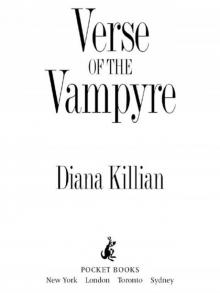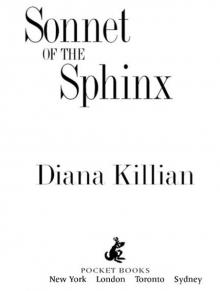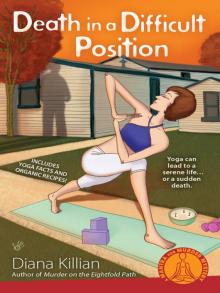- Home
- Diana Killian
Docketful of Poesy Page 19
Docketful of Poesy Read online
Page 19
“You’re an actress. You should understand about preparing for a role.”
“What role am I preparing for? The lead in The Song of Bernadette?”
“Well-bred young nob collecting junk for the local church bazaar.”
Cordelia muttered under her breath as I finished her hair.
“I think you look sweet.” I fished in my traveler’s jewelry case, and removed a pair of delicate pearl earrings. “Here. Take out those—what are they supposed to be?”
“Handcuffs,” she said smugly.
“Planning on a career behind bars when you graduate from school?”
“Ha ha.” She was grinning, and I shook my head.
*****
I had to give her credit though, she played her part beautifully.
We drove through the gates of the old Monkton Estate just before teatime, parked the Jag, and went up to the front door. Cordelia looked every inch Sloane Ranger in her own jeans and my pastel beaded blouse. Hair and makeup were just right, if I did say so myself, and her manner was perfect. Maybe it was genetic or maybe it was simply years of mimicking her cousin Allegra. She had that perfect blend of well-bred arrogance and slight ditziness down cold. All I had to do was try to look equally well bred and smile politely.
We got past the housekeeper with the mere mention of the Brougham name. Then we had to face the slim young male assistant I remembered from that morning at Rogue’s Gallery, but Cordelia’s spiel about the church bazaar and her Auntie Vee’s regrets about some mislaid garden party invitations made short work of him. Finally we were shown into a lovely, long room hung with gray silk wallpaper. The furnishings were all white and black—muted and elegant. There was a grand piano near French windows looking over a velvet-green lawn. A cadre of
sterling-framed photographs crowded the top of the piano. There were some exquisite watercolors on the walls and a few choice pieces of antique furniture that reminded me painfully of Peter. In fact, I recognized a small Chinese side table from Rogue’s Gallery.
A carved ivory and sterling chess set sat on the table. It, too, looked antique, but I didn’t recognize it. Not that I was now familiar with every item in Rogue’s Gallery.
While we waited for the Honourable Angela I wandered over to the piano and studied the photos. There were several posed pictures of a plain-featured woman with an excellent haircut and intimidating eyebrows—whom I took to be the MP. In the latest (judging by the age of the subject) of the photographs she was accompanied by a tall, sandy-haired man with a bland, very English face.
And there was a very large, framed photographic portrait of the same man on his own looking stolidly into the camera.
“What are we looking for?” Cordelia asked softly from behind me.
“I have no idea,” I whispered back.
“Is that her husband?”
“She’s not married. At least…I think someone said that she was newly engaged.”
A door opened behind us and a rich, sonorous voice announced, “My dear Miss Dumas. How delightful of you to come in person. I’m a great admirer of Venetia Brougham’s work.”
Angela Hornsby was a very well-preserved sixty-something. Her hair, nails, and makeup were all flawless. She was not pretty, but she clearly made the most of what she had, and the result was a poised and well-groomed woman, one whose success was based on much more than looks or charm.
Cordelia responded engagingly, apologized on behalf of her great-aunt who, if I’d understood her correctly on the drive over, would die a martyr’s death before she fed a member of the Labour Party her prawn canapés, and blithely invited Ms Hornsby for the following weekend’s festivities.
“This is my deah little friend Grace Hollister.” Cordelia was hamming it up shamefully as she introduced me to the MP. We shook hands briefly. Angela studied me with her cool gray eyes, and smiled.
“The author?”
“Why, yes.” Now that, I admit, surprised me. It’s not as though my work was on a best-seller list anywhere.
Angela Hornsby inclined her head toward the large photo. “George, my fiancé, mentioned your book and that you were living locally. He’s a great fan of history and adventure stories.”
“Does your fiancé live nearby?”
The man in the photograph was not familiar to me, but that didn’t prove anything. A lot had happened in six months. I realized belatedly that perhaps my question might be a little personal, but Angela answered composedly, “No. George lives in London. We’ll be using this house mostly as our weekend retreat until we retire.”
Cordelia’s eyes met mine. “You must bring George…er…Mr.…?”
“Robinson,” Angela supplied.
“You must bring Mr. Robinson next Saturday as well,” Cordelia said. “I know Auntie would insist.”
“That would be delightful. He was supposed to come down this weekend, but he was delayed on business. We hope to see him on Tomorrow or Tuesday.”
We. I wondered if that was the royal “we” or if she was referring to herself and her slim, elegant young aide.
I said, “I suppose we’ve come to the wrong house to collect for the church bazaar. You’re bringing lovely things in, not chucking them out.” I nodded to the little Chinese table. “I recognize that from Rogue’s Gallery.”
She raised her eyebrows. “That’s correct. Mr. Fox did deliver that table and two magnificent Rocco chairs just a day or two ago. An exquisite piece, isn’t it? Such a personable young man.” She smiled at me in a way that indicated she was aware of my relationship to Peter. Now why would that be? I suppose Peter might have mentioned something in passing, but it didn’t really seem like him. He was not much given to casual discussion of his personal life.
I indicated the chess set. “Do you play?”
“George is a chess fanatic. I’m afraid I’m a rather indifferent player. It’s a lovely set, isn’t it? George gave it to me as an engagement gift. The board is marble. The pieces are hand carved ivory and sterling. It’s Turkish. Early nineteen hundreds, I understand.”
“When is the wedding?” Cordelia asked, as Angela beckoned us toward a pewter gray brocade sofa.
“May. I’m determined to have the house ready by the end of April.” Angela waited till we’d seated ourselves on the long sofa, and then tucked herself neatly into a matching armchair. “Shall I ring for tea?”
We assented—trying not to seem too eager about it—and a tea tray arrived shortly after. Angela poured and discussed several political issues that “meant a good deal to her,” and then chatted about her bird-watching hobby. I watched and listened to her, and wondered if I was totally on the wrong track.
I simply couldn’t imagine anyone less nefarious than Angela Hornsby. She seemed a little dull, a little stuffy, but well-informed and purposeful. She reminded me of Margaret Thatcher. And I had no reason to believe she would make any less redoubtable a foe. Not that I could see why we should be foes. But unfortunately, the only clue I had to Peter’s mysterious behavior was that the day before he changed so drastically he had come to this house. Perhaps to this very room, if the little Chinese table indicated anything.
Sipping my tea, listening to Cordelia make small talk with our hostess, I tried to recall Peter as he had been that last morning. He had been tired. I hadn’t recognized it at the time, but looking back he had looked desperately tired, as though he hadn’t slept in days. And he had been angry. But more than angry, he had seemed like he’d received a bad shock. And he was not easily shocked—or angered, really.
Of course his anger and shock might have nothing to do with this house, this room, this woman. For all I knew he had gone straight back to Rogue’s Gallery and received whatever shocking or angering news there. Or he might have gone someplace entirely different that I knew nothing about.
I gazed around the pleasing, newly furnished room again. There seemed nothing here to indicate anything but gracious and genteel living. I studied Angela Hornsby as she nibbled on a biscuit
and listened politely to Cordelia’s blithe chatter about how theater reflected our understanding of the individual groomed to cope with the stifling pressures of modern society.
“I’m afraid I don’t really know what that means, my dear,” she said as Cordelia paused for breath.
Could anyone seem less like the possessor of a guilty secret than Angela Hornsby?
After forty-five minutes of tea and small talk, Cordelia and I escaped with a small petit point footstool for the church bazaar.
“Is it my imagination or was that a total waste of time?” Cordelia asked as she slipped behind the wheel of the Jag.
“I don’t know,” I admitted. “Did anything about her strike you as strange?”
“No,” Cordelia replied promptly. “Except that anyone that normal has to be off her nut.”
*****
When we reached the inn I found there was one message from my sister-in-law Laurel, and another from Brian.
“Nothing else?” I asked the girl at the desk.
She shook her head.
I started up the stairs to my room, struggling not to give in to the wave of disappointment. Now past my initial hurt and anger, I couldn’t believe that things between Peter and me would end on such a strange note. I couldn’t believe he wanted this separation any more than I did.
Did he really feel my refusal to instantly abandon the country and our plans merely on his say-so demonstrated lack of faith in him? Or had he forced this estrangement in an attempt to protect me?
I thought of his unfair interpretation of my delayed return to Innisdale. Six months did sound like a long time, but there had been so many legitimate reasons to postpone the trip. So many things to arrange. Or was I telling myself comfortable fibs? I had missed Peter horribly, that was true. Surely he knew that was true? But…I had enjoyed the time with friends and my family. It had been two years since my impulsive decision to stay in Britain. Two years since I had seen my loved ones. Was it so amazing that I’d put off leaving them again?
Maybe it had appeared like I wasn’t in a hurry to come home to Peter. Maybe I had seemed hesitant, uncommitted.
And the truth was…maybe…I did have a few doubts. Not about Peter. Not really. Maybe about myself. Maybe about whether we could ultimately make each other happy. I didn’t take commitment lightly. He knew that. And for me this was a huge step. A huge decision.
As it was for him.
I misstepped on the stairs, and reached for the banister as that thought struck home. Funny how until that very moment it simply had not occurred to me that if commitment seemed a big step for me, how unfamiliar and treacherous the territory must have appeared to Peter. Like walking out onto an ice floe.
Norton Edam, on his way down the staircase, glanced at me as I stood there having my untimely epiphany.
“Forget something?” he asked.
I blinked at him. He looked better than he had at breakfast. He’d shaved anyway, which was a start.
“Yes,” I answered. “I think I did.”
He smiled politely, edging past me.
“Any word on the production?” I asked.
“Not that I’ve heard.”
“Are you still planning to leave?”
“As soon as we get permission. Yes.” He kept moving, clearly not in the mood to stay and chat. I continued upstairs to my room.
Brian didn’t answer when I called on my cell phone. I left a message on his machine, changed out of my shirt and blouse into leggings and a sweatshirt, and seated myself at the little table before the window with a pen and paper—and the hitherto unopened box of chocolates.
I began to chart who had been present each time Mona had mentioned losing her flask. Granted, it was a long shot, but I remained convinced that Mona had been killed in mistake for Miles—especially having remembered that her flask had an “M” engraved in the front of it. Not that someone might not have wanted Mona dead for her own sake, but I felt the attack on Miles, and prior problems with the brakes on his car, were a pretty good indication he had been the true target.
Aided in my reflections by a chocolate-raspberry truffle, I tried to remember the first time Mona had mentioned misplacing her flask. Had it been just after we arrived at the Hound and Harrier? I remembered for sure that she’d mentioned that was missing at breakfast the morning before we’d been shooting the big lakeside gun battle. Roberta had made some joke about it. Who else had been there? Pammy. Tracy. Tracy had made some smart ass comment that I couldn’t remember.
Miles had been in the restaurant, but I had an impression that he’d walked out before Mona mentioned her flask—yes, because a few minutes later I’d heard him and Todd arguing in the little room off the lobby.
Not that I thought Miles was trying to kill himself. Of course he could always make it look like the attempt had been made on his life when the real target was Mona. But…no. While Miles could conceivably have faked the brakes going out on his car, he didn’t fake knocking himself out. And I felt certain the two things were connected.
So that left Todd.
No. Because I remembered passing Norton walking into breakfast as I was walking out. He’d said something about grabbing a bite before we left for location.
Todd and Norton. Both of whom had run-ins with Miles. I jotted my notes down, and popped another truffle into my mouth. Creamy hazelnut: divine. All I needed now was a glass of fine merlot. And someone to share my sleuthing with. Someone like Peter.
I shook the thought off.
There had been another time I recalled Mona mentioning losing her flask. When had that been? I couldn’t remember, but I was pretty sure it had been in the taproom there at the inn. And someone…Todd, I thought…had made a joke that Mona must subconsciously be deliberately misplacing her flask.
Had Norton been there too? I couldn’t remember.
Certainly both he and Todd were aware that Mona had a flask. A number of cast and crew carried flasks. It all came down to whether it had occurred to someone that Mona’s flask was frequently out of her possession. That the discovery of a small flask marked “M” might be Mona’s and not Miles’s. I had no idea if Miles’s flash was monogrammed or not. I had never seen it out of his possession.
It was such a horrible risk to take with other people’s lives, reinforcing my belief that whoever had committed this terrible crime was either totally oblivious to those around him—or her—or so obsessed with seeing Miles dead, that they simply didn’t care who got in the way. Which in itself was just another form of obliviousness.
Who had that kind of motive? Butting heads over creative differences just didn’t seem to cut it. You’d have to hate someone an awful lot to kill. Not just that…to risk being caught and imprisoned.
I glanced at the clock beside the bed. It was supper time. Just out of courtesy I knew I should really wait to walk down to Sally’s, as eager as I was to learn whether my sister-in-law had discovered any useful information.
Picking up another piece of chocolate, I eyed it thoughtfully. Poison was supposedly a woman’s weapon, but tampering with brakes suggested the masculine touch to me—sexist though that sounded.
The phone rang, jarring me out of my sinister reflections.
Chapter Twenty
“I have news on Peter Fox,” Brian said.
We were having dinner again at the Cock’s Crow. Plaice and chips in a pub—about as casual as one could get, but I still felt that I was having far too many meals with Brian—for both our sakes.
“Tell me,” I said.
“He was spotted on a Gatwick security cam—returning from a flight to Bergerac.”
Bergerac. The home of Cyrano. The capital of Dordogne—where British ex-pats flocked. Catriona.
All right. There could easily be other inducements for Peter to travel to France, especially such a beautiful part of France, besides wanting to see his psycho former sweetheart and partner in crime, Catriona Ruthven.
Off hand I couldn’t think of one, but m
aybe I wasn’t really trying.
“Was he alone?” I asked.
“Yes. That is, as far as I know. Officially he was traveling alone. Why?”
Although Brian was obsessed with Peter’s criminal past, apparently he didn’t know that Catriona was now living in the South of France. Maybe he didn’t care. Maybe he was only concerned with Peter and not Peter’s favorite former accomplice. We’d never really discussed it—Catriona Ruthven being one of my least favorite topics of conversation.
“I just wondered,” I said. “Why are you tracking Peter’s movements since he’s not a suspect in the murders of the February brothers?”
“He has an alibi,” Brian said. “That’s not the same thing as not being suspect. Any move Peter Fox makes, I want to know about.”
I ignored yet another implication that I would lie for Peter. After all, Tracy was helping provide that alibi as well. “Have you made any progress investigating their deaths?”
Whatever Brian might have answered, I missed because I was mulling over the abrupt realization that if Peter had gone to Catriona, I must be correct in my deduction: whoever was trying to kill him was tied into the ill-fated Istanbul job. Catriona was the other person most affected—most injured, if I wanted to be fair—by Gordon Roget’s betrayal.
Besides Roget, Catriona was the only other person who knew Peter had not double-crossed his mates. She was probably the only person who could intercede on Peter’s behalf with his former colleagues. And I was now convinced that the Februarys had been hired by one of the three remaining crooks.
Except…why didn’t Peter’s former criminal pals just take care of him themselves? Why hire two apparently boneheaded local assassins? Why had both attempts on Peter’s life taken place in broad daylight with lots of witnesses? Were the Februarys really that dumb or had there been some point to these attempts at public execution?
Granted, Peter’s felonious friends might not have all been as potentially murderous as Catriona, but surely they had the contacts to hire real professionals?

 High Rhymes and Misdemeanors
High Rhymes and Misdemeanors Corpse Pose
Corpse Pose Verse of the Vampyre
Verse of the Vampyre Sonnet of the Sphinx
Sonnet of the Sphinx Docketful of Poesy
Docketful of Poesy Death in a Difficult Position
Death in a Difficult Position Dial Om for Murder
Dial Om for Murder Murder on the Eightfold Path
Murder on the Eightfold Path